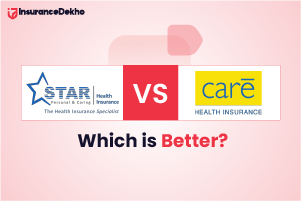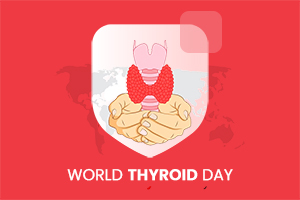

- Tax BenefitUp to 75000**
- Claim SupportEveryday 10AM-7PM
- 45 Lacs+Happy Customers
*Standard Terms and Conditions Apply.
**Tax benefits are subject to changes in Income Tax Act.
What is Copay Meaning in Health Insurance?
Co-payment meaning in health insurance the percentage of the claim amount which the policyholder is required to pay from their end and the rest is borne by the insurance company in case of a health insurance claim. There are many insurance companies offering health insurance plans with mandatory co-payment clauses, whereas others come with a voluntary co-payment option. The policy buyers can buy health insurance with voluntary co-pay and enjoy a reduced premium for that policy.
Co-payment clauses in health insurance policies are comparatively cheaper since they reduce the insurer's liability by sharing losses with both the insured and the insurer. For instance, a health insurance policy comes with a co-payment clause of 10% and a claim of Rs. 50,000 arises during the policy term. Then if the claim request gets approved, the insured will be required to pay 10% of the amount, that is Rs. 5,000 from his/her own pocket and the insurance company will bear the remaining amount, that is Rs. 45,000.
How Copay in Insurance Works?
An insured individual can file a claim for health insurance either through cashless or reimbursement of the expenses. In case of availing cashless medical treatment and filing the claim, the health insurance company settles the expenses incurred directly with the hospital where the insured or family members are undergoing treatment. On the contrary, in the case of a reimbursement claim, the health insurance company reimburses the insured for the expenses incurred while undergoing treatment.
Talking about co-payment in both situations, it can be found that:
- Insurers who opt for a higher co-pay will be able to lower their total premium payment but will have to pay a greater amount during a claim.
- On the other hand, if the insured opts for a lower co-pay, the amount to be paid during the claim gets reduced but also requires the insured to pay a higher premium against the health insurance.
Example of Copay in Health Insurance
Mr. Jain has a health insurance policy with a copay of 20%. This 20% means that when you make a visit to the hospital, you will have to spend 20% of the medical expenses from your own pocket. The remaining 80% will be borne by the insurance company. This example indicates that copayment means the amount spent by the policyholder along with their health insurance policy.
Impact of Copay on Health Insurance Premiums
Copay in medical insurance plays a considerable impact on health insurance premiums. Wondering how, here are the different scenarios you should know about:
- High Copay: If the copay is high, then the health insurance premium will be lower. This is because in such a case the policyholder has agreed to pay a higher amount as a copay
- Less Copay: On the other hand, if the copay is less, then health insurance premium in such a case will be higher.
What Are the Features of Co-Payment for Insurance Clause?
To have a better understanding of the co-payment clause in health insurance, read along with its features include:
- In the co-pay clause, a major portion of the claim is covered by the health insurance company while the insured has to take care of a specific percentage of the expense incurred.
- The percentage of co-payment depends on the medical service availed.
- If the insured opts for a lower co-payment amount, they need to pay a higher premium.
- co-pay clauses are implemented in the case of senior-citizen health insurance policies.
- Co-payment is mostly popular in metropolitan cities where the treatment costs are higher in comparison to smaller towns and cities.
Why Is Co-Pay in Insurance Clause Included in Policies?
Many insurance companies offer health insurance plans with co-payment clauses as it helps them save a considerable amount at the time of claims. Other reasons for the inclusion of the co-payment clause in health insurance plans are listed below:
- People are discouraged from making unnecessary claims as they are required to pay a portion out of their own pockets, so they might refrain from making claims considering it will add to their expenses. This leads to a lesser number of claims, especially in the case of minor illnesses such as the common cold, regular gastric distress, etc. people may avoid making claims. This reduces the paperwork from both parties. So, simply put, the co-payment clause discourages the insured from making unnecessary claims.
- The co-payment clause discourages people from availing themselves of treatments at expensive healthcare centers or hospitals as the insurers also need to pay a certain amount from their own pocket. For instance, if the treatment is availed at an expensive hospital, and the claim amount is Rs. 1 Lakh and the co-payment is 10%. Then the insurance company will pay Rs. 90,000 and the remaining Rs. 10,000 will be paid by the insured. But if the treatment is availed at a regular hospital and the claim amount is of let’s say Rs. 70,000, then the insured will be required to pay Rs. 7,000 only. As the insured is required to pay a higher amount from their own pocket if availing of treatment at an expensive hospital, hence, he/she will prefer availing treatment at a regular hospital or healthcare centre to save more, thereby benefiting the insurance company as well.
- By requiring the insured to pay a portion of the expenses incurred, the co-payment option promotes the judicious use of health insurance plans. This encourages the insured to use his/her health insurance policy the right way.
- As the insured bears a portion of the claim amount, it reduces the insurance company's risk and liability. For instance, if there is a co-payment clause of 10% in a health insurance policy, then this 10% will come as a profit for the insurance company as the insured will pay this from his/her own pocket.
What Are the Types of Co-Payment Clauses in Health Insurance?
Before discussing the types of co-payment clauses, please note that not all health insurance policies include mandatory co-pays. In case, your health insurance policy has a clause of co-payment, it could be any of the below-mentioned types along with their applicability:
- On Medical Bills
In this type, the co-pay clause will be applicable to all the claims raised, regardless of the fact that the co-pay is mandatory or voluntary. As a result, you will have to pay a portion of the claim amount thus raised from your own pocket.
- On Senior Citizen Policies
The medical treatment expenses for senior citizens are usually much higher than for young individuals and this is why health insurance policies for senior citizens generally come with a mandatory co-pay clause.
- For Reimbursement Claims or Treatment Availed at Any Non-Network Hospital
There are cases in which health insurance companies only implement the co-payment clause on reimbursement claims or when the insured individual avails medical treatment at a non-network hospital. If you find yourself in the same situation, know that your health insurance company will bear the cashless claims.
- For Hospitalisation in Metro Cities
In metro cities, medical treatment costs are higher than in smaller towns and cities, so your health insurance company may levy a co-payment clause.
The Benefits of the Co-Payment for Insurance Clause in Health Insurance?
One of the biggest benefits of the co-payment clause in health insurance is that it helps the policyholder reduce the premium amount paid towards their insurance policy.
Even if the policyholder has to pay a specific percentage of their claim, co-payment helps in reducing the periodic expenditures by reducing the health insurance premium payment.
Things to Remember Before Choosing a Policy With the Co-Pay in Insurance Clause
Make sure you keep the following things in mind before choosing a policy with a co-payment clause:
- In spite of the co-payment clause in your health insurance policy appearing to be affordable to you, it is important to pay attention to your requirements first before making a decision.
- It would be a must to ensure that you have an abundance of finances to pay for your part of hospitalisation bills before choosing a plan with co-pay options.
- Even though health insurance plans featuring the co-payment option may come across as a great idea, they do not reduce financial liabilities in case of medical emergencies in a significant manner.
If not ready with the conditions and situations that may accompany a co-payment clause, it is advisable for you to choose health insurance that does not have a co-payment clause.
Difference Between Co-Payment and Deductible
While choosing one of the best health insurance policies with a co-payment option, know that it would be important for you to understand that co-payment and deductible are two different features of health insurance. They may relate to the payment on the insured individual’s part but differ in terms of amount and frequency.
Unlike co-payments, deductibles are set amounts that the insured pays each year before their health insurance policy begins covering medical expenses. Co-payments are fixed amounts, whereas deductibles are fixed amounts that the insured pays each year before their health insurance policy begins covering medical expenses. Once the insured individual pays the deductible for the year, then until next year they do not have to pay anything. On the contrary, co-payment is an ongoing process that requires the policyholder to pay every time a health care service is availed.
Factors to Consider While Buying a Co-Payment Health Insurance Policy Option
If you are willing to buy a health insurance policy with the co-payment option, make sure you keep the below-mentioned factors in mind:
- Percentage of co-payment: The percentage of copayment in healthcare is the percentage of the cost that the policyholder has to pay from their own pocket. For instance, if the insured individual bears a medical bill of Rs. 50,000 and has an option of a 10% co-payment, the insured will have to bear Rs. 5,000 from their own pocket while their health insurance company will pay the remaining Rs. 45,000. Therefore, before you go forward with the purchase, make it a point to check the percentage of the co-payment clause in the policy.
- Premium: Most health insurance policies featuring the co-payment clause will have lower premiums. Make sure you perform a comparison of a policy with co-pay with other general health insurance policies and notice the change in premium amounts before making a final call.
- Health Condition: If you think you are fit and have no pre-existing illness, then it makes sense to choose a higher copay. This will help you save on health insurance premiums.
- Coverage: You should keep in mind the coverage you require under your health insurance premium. It is when you choose the right coverage, that will you be able to make the best use of your health insurance policy.
Who Should Opt for Copay in Health Insurance?
Listed below are the group of individuals who should opt for copay in health insurance:
- Those who are fit and do not require frequent medical treatment
- Budget-conscious individuals who do not plan to spend a lot on health insurance premium
- Individuals who have emergency funds or those who can tackle medical emergencies at any time
- Those who are looking for affordable health insurance plans
Why not all Insurers Offer a Co-Payment Health Insurance Clause?
There are many health insurance companies that do not offer co-payment clauses in their health insurance plans., Some of them are explained below:
- In case the co-payment clause is very high, then the insured individual may refrain from making a claim even for life-saving medical attention and care, which completely fails the purpose of being covered under a health insurance policy. Hence, having a health insurance policy with a high co-payment is pretty much similar to staying uninsured. Also, it would not be affordable for all to bear high healthcare expenses from their own pocket and hence would not go for a health insurance policy with a high co-payment.
- Health insurance penetration is already not good enough in India and when health insurance plans come with clauses like co-payment or co-insurance, then the policy buyers are even less interested in buying them. As people prefer health insurance plans that offer them complete protection against healthcare expenses without any cost-sharing, plans with a co-payment clause are less likely to be purchased by policy buyers. This impacts the sales of an insurance company and hence not many insurance companies prefer offering health insurance plans with a co-payment clause.
Even though health insurance plans with co-payment clauses are more affordable to buy, it is essential for you to determine coverage requirements before you shortlist them for your health insurance requirements.
Health Insurance Calculator
Whom do you want the insurance for ?
Where do you live ?
Choose required Coverage for yourself?
Buy Coronavirus Health Insurance Policy

*Tax benefits are subject to changes in Income Tax Act.
Types of Health Insurance Plans
Health Insurance Terminologies
Buy Critical Illness Health Insurance
Learn more about copay Health Insurance
Best Insurance Advisors in Your City.
FAQ About Co-Pay in Health Insurance
-
-
What should I choose? High copayment low premium or low copayment and high premium?
It is important to understand that plans with lower monthly premiums have higher copayments and higher deductibles. On the contrary, plans that charge higher monthly premiums have lower copayments and lower deductibles. When selecting a plan, make sure to buy an expensive plan with lower copayment and a lower deductible.
-
How can I know about my copayment liability at the time of claim settlement?
Make sure you read your health insurance policy document carefully as it will comprise every detail related to your copayment option, be it whether you need to pay it or not or the percentage of copayment levied.
-
Can copayment be levied on cashless hospitalization?
Health insurance companies mostly levy copayment options on reimbursement claims to encourage policyholders to avail treatment at network hospitals.
-
Are health insurance policies with a copayment clause cheaper?
Yes! Health insurance policies that feature the copayment clause are cheaper as the claim settlement liability gets divided between the insured and the insurance provider.











































.jpg)
























